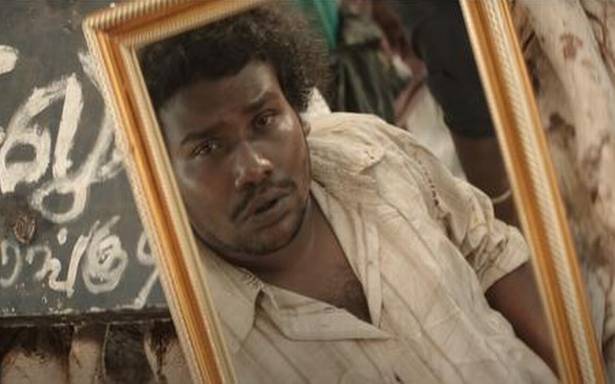Debutante Madonne Ashwin’s ‘Mandela’ is a first-rate political satire that shows how deep-seated caste is, by taking an unflinching yet unsentimental look
There is a minor detail — packed in the form of a dialogue that you may miss noticing — in Mandela, that tells more about caste structure than the film. It arrives when violence breaks out between two dominant caste groups, the leaders of whom are half-brothers and are pitted against each other in the local body elections.
In the raging war between the North and the South, the regions predominantly occupied by the two caste groups, Yogi Babu, a barber, stands in the middle. Looking at him, a character wonders if he was thekkoru (South) or vadakkuoru (North) and the man next to him says, “He is podhu (public).” Note that he doesn’t own a land.
This seemingly inconsequential piece of conversation speaks volumes of the mentality of the upper-caste/dominant caste, especially in the way they perceive Dalits as public property that they can possess and poach on. It comes from a place of entitlement and this callous attitude over the oppressed is the spirit that holds Mandela together, treading a careful line between romanticising caste practices and making a mockery of them.
Mandela
- Cast: Yogi Babu, Sheela Rajkumar, Sangili Murugan, GM Sundar and Kanna Ravi
- Director: Madonne Ashwin
- Storyline: Ahead of the local body elections in Soorangudi, the leaders of two dominant caste groups coax into getting the vote of a Dalit, as the vote count from their respective caste comes to a draw.
We see the entitlement from the very beginning when Rathnam (GM Sundar) and his cohort organise an inaugural ceremony for a public toilet that they built for their caste, who live in the North. His half-brother, Madhi (Kanna Ravi), is from a supposedly lower yet dominant caste, who fights for the rights of “his” people. Their patriarch father Ayya (Sangili Murugan) is a Periyar follower and has two wives (from the two castes), in his larger goal to unite these two warring groups and to abolish caste in the village. But that sounds a little convenient, right?
At the inaugural ceremony, a song from Yejaman is played in the background, perhaps, to indicate something. A character from Rathnam’s cohort is always seen removing his footwear every time violence breaks out and seems to be overprotective of it. The two groups are at warheads as to who would inaugurate the toilet — the northerners or southerners? Yes, there is a caste implication in everything, even in what you eat. When Ayya volunteers and when he passes out, in the ensuing tussle between the two groups outside, they look for an ilicha vai (innocent) person to clean up the mess. Do check out the documentary Kakkoos. The ilicha vai in Mandela is Yogi Babu, who does not have a name and is referred as ilicha vai (think of Chappani from 16 Vayathinile). More than anything, he is the podhu that was mentioned in the previous paragraph. And Mandela is this story of a single person’s struggle in reclaiming a) his identity and b) to break free from the identity that was bestowed upon him by society.
Ashwin’s film is born out of a simple idea: half-brothers. Think of Agni Natchathiram. Think of Cheran Pandian. Mandela is more on the lines of the latter, but it ends up correcting what the KS Ravikumar film flirted with. One of the things that really work in its favour is how honest and earnest the film remains till the very end. And this earnestness seems to come from a place of self-awareness, as Ashwin and the makers seem to be aware of their privilege. That, one suspects, is the reason why they have made Mandela as a satire. Sometimes, we laugh with them and sometimes, we laugh at them, which is the film’s achievement: to draw humour out of a serious issue like caste and vote-bank politics.
It is self-aware because it understands caste structure. Take this scene, for instance. When Mandela (Yogi Babu, who just owns the film in the second half) is given a buffet of options (of names) to pick from, they narrow down on Nelson Mandela, the former President of South Africa. In that scene, Yogi Babu innocently remarks: “What if that was an upper-caste name?” That sense of fear is real.
The film does not explore the conditions that made people like Mandela an outcast by the same people who are now vying for his vote. Instead, what it does get right is to not make the character feel apologetic, like last year’s Serious Men, about the offers that he receives from the caste leaders. The saviour template is (delightfully) inverted. Yet, it is a bit of a drag and sometimes too melodramatic.
There is no explicit mention of caste names, or political parties. Everything is implied and reduced to background information, and we are left to draw our own conclusions. I particularly liked how Ashwin had used Ramki as one of the photos you find in Mandela’s saloon. People who grew up in the 90s would know how the actor, like Rajinikanth, was well-known for his hairstyle.
For a film like Mandela, you somewhere begin to worry on how it is going to end. The suspense starts building within you, but Ashwin gives a fitting conclusion with a voiceover and a static shot — perhaps to indicate a larger point: it takes a village to stand up for one’s right.
Mandela releases on Vijay TV on April 4 at 9.30am.
Source: Read Full Article

